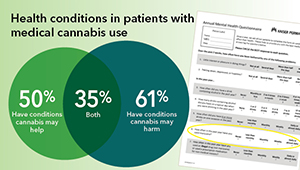Theresa Matson, PhD, MPH
Biography
Theresa (“Tessa”) Matson aims to make addiction health services more accessible, acceptable, and equitable to patients. She recognizes that strong partnerships with health system leaders, clinical staff, and patients are necessary to identify unhealthy substance use and improve the treatment of substance use disorders — and she is enthusiastic about engaging stakeholders in the design and implementation of these efforts. She joined Kaiser Permanente Washington Health Research Institute (KPWHRI) in 2016 as a student intern and has held several roles since then, formally joining the KPWHRI faculty as a collaborative scientist in 2022. Dr. Matson is also an affiliate assistant professor in the Department of Health Systems and Population Health (HSPop) at the University of Washington.
With advanced training in quantitative and qualitative methodology, Dr. Matson is developing methods to improve the measurement of treatment for alcohol, cannabis, and other substance use disorders from administrative data such as electronic health records and insurance claims. She is interested in ways that measurement may perpetuate biases that persist in the social world or produce new paths for discrimination under the guise of objectivity. She currently collaborates on trials designed to improve the provision of care for opioid and substance use disorders in primary care and mental health settings. These trials, funded by the National Institute on Drug Abuse, include studies that promote equity in access to digital interventions for unhealthy substance use.
Dr. Matson earned her MPH in health services and her PhD in health systems and population health from the University of Washington. Her dissertation leveraged routinely collected data from Kaiser Permanente Washington to describe gaps and potential biases in diagnosis and treatment of cannabis use disorder and validated practical tools to improve cannabis use disorder recognition in primary care. The University of Washington School of Public Health awarded Dr. Matson the Gilbert S. Omenn Award for academic excellence.
Prior to becoming a collaborative scientist, Dr. Matson was a pre-doctoral fellow at VA Puget Sound, where she studied system-level, organizational-level, and patient-level determinants to receipt of evidence-based treatment for alcohol use disorder. She also worked as a research interventionist at KPWHRI, where she designed patient-centered interventions, coached patients in behavioral health change using motivational interviewing, and engaged research participants in projects to improve clinical tools and workflow through user-centered design principles.
She is a lifelong learner and aspiring adventurist with a tendency of collecting hobbies in her spare time. Currently, you’ll find her at Home Depot, checking out power tools for her latest home improvement project.
RESEARCH INTERESTS AND EXPERIENCE
-
Addictions
-
Mental health
-
Health services & economics
-
Implementation science
-
Preventive medicine
-
Social determinants of health
Recent Publications
Hallgren KA, Matson TE, Oliver M, Wang X, Williams EC, Bradley KA. Test-retest reliability of DSM-5 substance use symptom checklists used in primary care and mental health care settings. Drug Alcohol Depend. 2024;256:111108. doi: 10.1016/j.drugalcdep.2024.111108. Epub 2024 Jan 24. PubMed
Simon CB, McCabe CJ, Matson TE, Oliver M, Bradley KA, Hallgren KA. High test-retest reliability of the Alcohol Use Disorders Identification Test-Consumption (AUDIT-C) questionnaire completed by primary care patients in routine care. Alcohol Clin Exp Res (Hoboken). 2023 Dec 15. doi: 10.1111/acer.15245. [Epub ahead of print]. PubMed
Ford MA, Lapham GT, Matson TE, Luce C, Oliver MM, Binswanger IA. Comparing cannabis use for pain to use for other reasons in primary care patients. J Am Board Fam Med. 2023 Oct 31:jabfm.2023.230163R1. doi: 10.3122/jabfm.2023.230163R1. [Epub ahead of print]. PubMed
Matson TE, Williams EC, Lapham GT, Oliver M, Hallgren KA, Bradley KA. Association between cannabis use disorder symptom severity and probability of clinically documented diagnosis. Drug Alcohol Depend.. 2023 Oct 1:251:110946. doi: 10.1016/j.drugalcdep.2023.110946. Epub 2023 Aug 23. PubMed
Lapham GT, Matson TE, Bobb JF, Luce C, Oliver MM, Hamilton LK, Bradley KA. Prevalence of cannabis use disorder and reasons for use among adults in a US state where recreational cannabis use is legal. JAMA Netw Open. 2023 Aug 1;6(8):e2328934. doi: 10.1001/jamanetworkopen.2023.28934. PubMed
New findings

Better tools for assessing substance use disorder
A simple checklist developed at KPWHRI does well at measuring symptoms of substance use disorder.
Research roundup

What's new in cannabis use research?
Use in pregnancy and screening in primary care studied by KPWHRI’s Kiel, Matson, and Lapham.
Electronic health records

EHR study offers insights on medical cannabis use
New research examines providers’ notes to understand patients’ cannabis use and health conditions.
KPWHRI in the media
Substance use checklist effective in primary care
Substance use checklist demonstrates validity, feasibility in primary care
Healio, June 13, 2023



